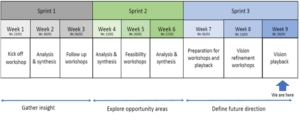DEFRA CPR visioning sprint group – a summary of the experience
Late last year, DEFRA began the process of developing an industry engagement sprint with the aim of setting out a long term vision for the CPR (Collection and packaging reforms). CPR encapsulates EPR, DRS and consistent collections as a full package, with the vision an aim of what we (industry) would like the schemes to look like in 10 years’ time.
The sprints consisted of a number of sessions with DEFRA and Kainos consultancy (whom had been brought in as a facilitator) over a 9 week period from January – March. Martin Hyde took part in the sprints as an Alupro representative, below is a short summary of his visioning sprint experience.
What were the goals of the sprints?
DEFRA outlined several key aims of the sprint process which were:
- Collaboratively define a longer-term vision for the Packaging Reforms
- Identify strategic objectives to deliver the Packaging Reforms vision and identify the associated activities required to deliver and achieve the end state vision
- Ensure all assumptions on achieving the objectives have been captured and risks and challenges identified.
- Co create a shared high-level outcome focused roadmap for post 2023 and identify any gaps in delivery of the reforms that could hinder realisation of the end vision
How did the sprint groups work?
Following an initial, in-person event in London, sprint attendees were split into a total of 4 groups to develop a long term vision. In the build-up, Industry highlighted concerns that DEFRA were attempting to silo us into groups (trade associations, producers etc) to restrict wider discussions. This led to DEFRA developing cross industry stakeholder groups with a wide range of representation in each covering Producers, Trade Associations, NGOs, Waste management / reprocessors and Retailers.

Initial barriers to progress:
The sprint process what somewhat disrupted throughout due to DEFRA’s mandate to focus on a 10 year vision rather than considering the short term issues on the horizon. This proved a concern for many attendees due to the significant, ongoing short term issues related to all three of the key CPR policies.
There was also a significant amount of “venting” at first, it is clear that this process should have been started earlier, and several people were frustrated at DEFRA’s historic lack of engagement with the sector. This also aligned with concerns that the outputs of the sprints might not be taken forward or considered seriously by the government.
Sprint Vision – Output:
Below is an extract from the final visioning sprint session which outlines the key Vision and delivery targets collated from the exercise.

The process involved considerably more detail than is shared here, once the initial barriers had been overcome, some good progress was made by the sprint groups at establishing the major obstacles that the CPR proposals must overcome as well as how to enable the above aims through government and industry collaboration. This also offered an opportunity to highlight to DEFRA that if we cannot measure the impact of these reforms properly, success is hard to determine.
What are the major take aways from the process?
Stakeholder understanding – The largest benefit from this process was an improved, joint understanding across the sector that as stakeholders, we agree on far more than we previously thought. As a result of the mixed stakeholder representation in each sprint group, there was a strong opportunity to align views and understand other stakeholders issues and concerns more clearly. Whilst this may not have been DEFRA’s aim, it has led to a much more aligned industry stakeholder value chain.
Governance issues – One major point that was consistently highlighted through the process was the need for strong scheme governance for EPR, which had clear stakeholder representation. Whilst this does not necessarily align with the government’s decision make the Scheme Administrator a public body, it does highlight the need for as much industry involvement as possible.
4 key areas for focus – DEFRA fed back to the wider group on the 21st March, including a summary of each sprint groups progress. This covered four key themes for success under CPR:
- Governance – representation and action
- Performance – targets, enforcement, and producer engagement
- Citizens – messaging, engagement, and accessibility
- Infrastructure – End of life treatment, material quality and value
What is next?
Towards the end of the sprint sessions, industry established a transition plan steering group, made up of participants from each group working together to develop a transition plan towards the 10-year vision. The group is aiming to develop a transition plan framework by the end of May.





Got a question or comment?
Contact Us